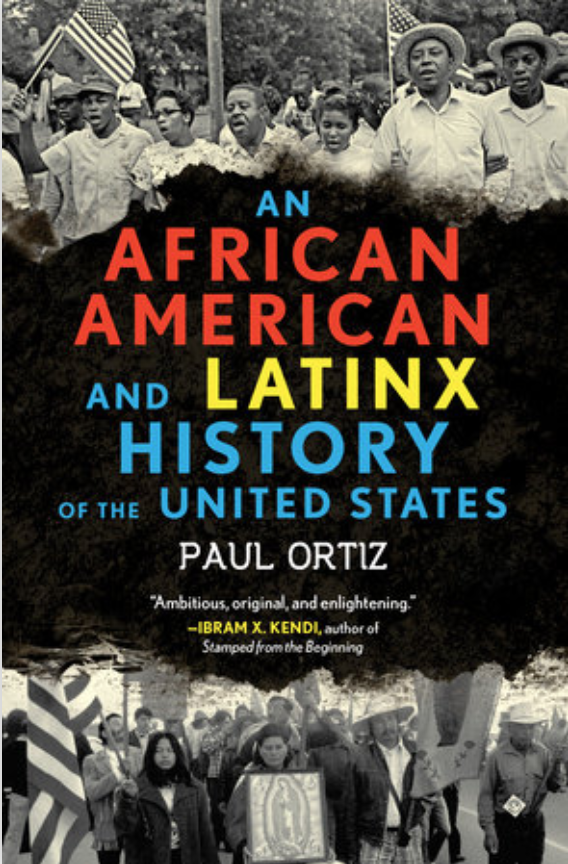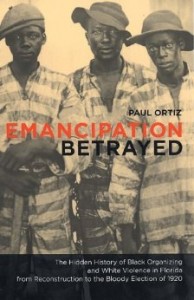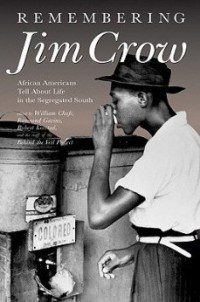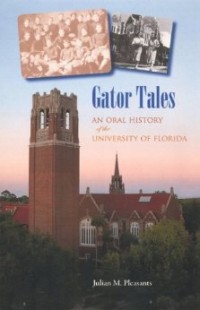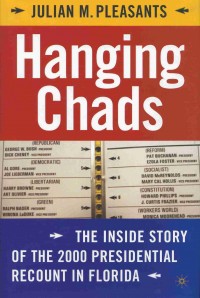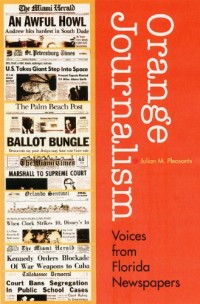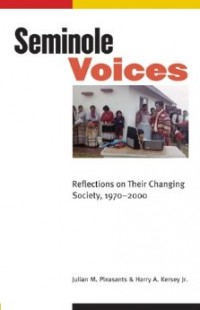Oral histories from the Samuel Proctor Oral History Program Collections have been used in a variety of different publications on historical topics. The Books and Research Publications section highlights a selection of these works.

Research Publications
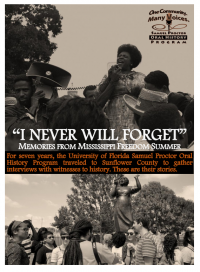
“I Will Never Forget: Memories from Mississippi Freedom Summer” 2014
In June 2014, SPOHP returned to the Delta to conduct additional oral histories and participate in reunion celebrations for the 50th anniversary of Freedom Summer, (June 23-29, 2014) in partnership with the Sunflower County Civil Rights Organization. The trip also marked conclusion of a processing mini-grant from George A. Smathers Libraries that enabled the Samuel Proctor Oral History Program to process over 100 interviews, compiled into an edited volume “I Will Never Forget: Memories from Mississippi Freedom Summer,” (opens in new tab) by MFP coordinator Sarah Blanc and Dr. Paul Ortiz.
The book was shared with civil rights veterans at the June 2014 reunion as well as local community members, schools, libraries, museums, and hotels, in publication made possible through sponsorship from the UF Center for Women’s Studies and Gender Research, Center for Undergraduate Research, Center for Humanities and the Public Sphere, Department of History, Milbauer Program in Southern History, African American Studies Program, Phi Alpha Theta chapter, and George A. Smathers Libraries.
Read “I Never Will Forget!” — PDF
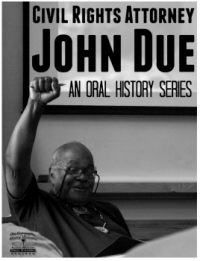 Read “Civil Rights Attorney John Due: An Oral History Series” (2014) — PDF
Read “Civil Rights Attorney John Due: An Oral History Series” (2014) — PDF
“Civil Rights Attorney John Due: An Oral History Series” 2014
In October 2014, civil rights attorney John Due celebrated his eightieth birthday. “Civil Rights Attorney John Due: An Oral History Series” was compiled by the Samuel Proctor Oral History Program to commemorate the life and work of Attorney John Dorsey Due and his family, in celebration of his eightieth birthday.
Attorney John Dorsey Due, Jr., has been a civil rights advocate for over fifty years, beginning as a member of the Terre Haute, Indiana Youth Council of the NAACP at the age of 14. As a civil rights lawyer and as an activist, he helped litigate, or was otherwise involved in, Due v. Tallahassee Theaters (Leon County, 1963); Florida v. Hayling (St. Johns County, 1963); Mississippi v. Due (Liberty County, 1964); Schwerner v. City of Meridian Mississippi (1964); Andrew Young v. Farris Bryant (1964); Waller v. State of Florida, (Pinellas County, 1966); and is the last litigator of the 1969 Miami-Dade County school desegregation case Pate v. Dade County Public Schools. This case began as a NAACP LDF sponsored case in 1958, Gibson et al v Dade County Public Schools.
For his wide-ranging activities and public service, Due has received the Chancey Eskridge Distinguished Barrister Award from the 2004 Annual Convention of the Southern Christian Leadership Conference, the 2004 Martin Luther King “Keepers Of The Dream Award” from the City of Miami and Miami-Dade County; the “Foot Soldiers Award” from the 2003 national convention of the NAACP; and a special “Lifetime of Fighting for Social Justice Award—a Living Legacy of the Civil Rights Movement” from the 2003 national convention of Jobs with Justice.
The book was shared at Mr. Due’s eightieth birthday celebration the weekend of October 25, 2014, in Tallahassee. Sarah Blanc edited and compiled the volume of interviews conducted by Michael Brandon, Jessica Charlton, Justin Dunnavant, Justin Hosbey, Steven Houston, and Dr. Paul Ortiz. Transcripts were completed by Sarah Blanc, Amelia D’Costa, Diana Dombrowski, Justin Dunnavant, Derick Gomez, Brittany Hibbert, Anna Jiminez, Genesis Lara, Annemarie Nichols, and Jessica Taylor. Recording and audio mastery of interviews by Deborah Hendrix, with cover photo by Jes Baldeweg-Rau.
Read “Civil Rights Attorney John Due: An Oral History Series” (PDF)
Books and Edited Volumes
Spanning more than two hundred years, An African American and Latinx History of the United States is a revolutionary, politically charged narrative history, arguing that the “Global South” was crucial to the development of America as we know it. Scholar and activist Paul Ortiz challenges the notion of westward progress as exalted by widely taught formulations like “manifest destiny” and “Jacksonian democracy,” and shows how placing African American, Latinx, and Indigenous voices unapologetically front and center transforms US history into one of the working class organizing against imperialism. Click here to purchase (opens in new tab).
“Emancipation Betrayed: The Hidden History of Black Organizing and White Violence in Florida”
by Dr. Paul Ortiz, Director of the Sam Proctor Oral History Program
(University of California Press, 2005)
Book available through Amazon (opens in new tab)
In this penetrating examination of African American politics and culture, Paul Ortiz throws a powerful light on the struggle of black Floridians to create the first statewide civil rights movement against Jim Crow. Concentrating on the period between the end of slavery and the election of 1920, Emancipation Betrayed vividly demonstrates that the decades leading up to the historic voter registration drive of 1919-20 were marked by intense battles during which African Americans struck for higher wages, took up arms to prevent lynching, forged independent political alliances, boycotted segregated streetcars, and created a democratic historical memory of the Civil War and Reconstruction. Contrary to previous claims that African Americans made few strides toward building an effective civil rights movement during this period, Ortiz documents how black Floridians formed mutual aid organizations–secret societies, women’s clubs, labor unions, and churches–to bolster dignity and survival in the harsh climate of Florida, which had the highest lynching rate of any state in the union. African Americans called on these institutions to build a statewide movement to regain the right to vote after World War I. African American women played a decisive role in the campaign as they mobilized in the months leading up to the passage of the Nineteenth Amendment. The 1920 contest culminated in the bloodiest Election Day in modern American history, when white supremacists and the Ku Klux Klan violently, and with state sanction, prevented African Americans from voting. Ortiz’s eloquent interpretation of the many ways that black Floridians fought to expand the meaning of freedom beyond formal equality and his broader consideration of how people resist oppression and create new social movements illuminate a strategic era of United States history and reveal how the legacy of legal segregation continues to play itself out to this day.
Reviews
“Paul Ortiz’s lyrical and closely argued study introduces us to unknown generations of freedom fighters for whom organizing democratically became in every sense a way of life. Ortiz changes the very ways we think of Southern history as he shows in marvelous detail how Black Floridians came together to defend themselves in the face of terror, to bury their dead, to challenge Jim Crow, to vote, and to dream.”
–David R. Roediger, Author of “Colored White: Transcending the Racial Past”
“Emancipation Betrayed is a remarkable piece of work, a tightly argued, meticulously researched examination of the first statewide movement by African Americans for civil rights, a movement which since has been effectively erased from our collective memory. The book poses a profound challenge to our understanding of the limits and possibilities of African American resistance in the early twentieth century. This analysis of how a politically and economically marginalized community nurtures the capacity for struggle speaks as much to our time as to 1919.”
–Charles Payne, Author of “I’ve Got the Light of Freedom”
“Remembering Jim Crow: African Americans Tell About Life in the Segregated South”
Edited by William H. Chafe, Raymond Gavins and Robert Korstad, with Paul Ortiz et al.
Winner of the 2002 Lillian Smith Book Award
(The New Press, 2001)
Book available through Amazon (opens in new tab)
“Remembering Jim Crow,” the groundbreaking sequel to “Remembering Slavery,” is an extraordinary opportunity to read and hear the voices of black southerners who were firsthand witnesses to one of the most heartbreaking and troubling chapters in America’s history. Based on interviews collected by the Behind the Veil Project (opens in new tab) at Duke University’s Center for Documentary Studies (opens in new tab), this remarkable book-and-CD set presents for the first time the most extensive oral history ever recorded of African American life in the racially segregated South.
In vivid, compelling stories, men and women from all walks of life tell how their most ordinary activities were subjected to profound and unrelenting racial oppression—in the workplace, on street corners, and above all in the public facilities and institutions that systematically demeaned, disenfranchised, and disempowered black people, condemning them to second-class citizenship. At the same time, Remembering Jim Crow is a testament to how black southerners fought back against the system, raising children, building churches and schools, running businesses, and struggling for respect in a society that denied them the most basic rights. The result is a powerful story of survival enriched by vivid memories of individual, family, and community triumphs and tragedies.
Remembering Jim Crow is accompanied by two one-hour compact discs of the companion radio documentary produced by American RadioWorks (opens in new tab). A transcript of the audio programs is included in the book’s appendix, and the book is illustrated with fifty rare segregation-era photographs collected from African American families who participated in the oral history project. Boxed set: hardcover book with 2 one-hour compact discs; 50 black-and-white photographs.
“Gator Tales: An Oral History of the University of Florida”
by Dr. Julian Pleasants, former director of the Sam Proctor Oral History Program
(University Press of Florida, 2006)
Book available through Amazon (opens in new tab)
This lively, anecdotal history provides an intimate look at the University of Florida’s past 100 years – from the earliest days in Gainesville to milestones in campus expansion and institutional growth, including the infamous Johns Committee, Civil Rights protests and Gator athletics.
UF’s thirteen presidents provide a colorful introduction to a remarkable century’s progress. As early as 1909, Albert A. Murphree recognized the university’s growing pains and embarked on a drive to expand significantly on the campus’s two buildings. During his tenure, UF experienced the influenza pandemic and greeted the inaugural issue of the Florida Alligator. Subsequent administrations augmented the university’s strengths in new ways. John J. Tigert gave UF its first constitution. While presiding over the introduction of women into university life, J. Hillis Miller initiated the most energetic building expansion in the university’s history, while securing the addition of medical and nursing schools at UF. The building frenzy continued apace under J. Wayne Reitz, who also invested considerable effort in improving the life of the campus, adding housing for married students and co ed dorms. Reitz also maintained an active involvement in the athletic program, even venturing a stormy half time visit to an FSU locker room where he berated the coach for using stalling tactics. He demanded FSU either “go out there and play ball” or “go home right now.”
Beyond the administrative history of the first 100 years, Gator Tales features interviews with nine notable individuals whose influences have extended from within UF to the broader worlds of business, law, and sports: Ray Graves, Otis Boggs, Tracey Caulkins, Steve O’ Connell, John Lombardi, Marna Brady, John Dasburg, Manny Fernandez, and Stephan Mickle. Each interview provides a window into a particular time and set of challenges in the history of UF, while reflecting the personal qualities that enabled each individual to have a substantial impact on both colleagues and the institution itself.
“Hanging Chads: The Inside Story of the 2000 Presidential Recount in Florida”
by Dr. Julian Pleasants
(Palgrave Macmillan, 2004)
Book available through Amazon (opens in new tab)
Dr. Julian Pleasants writes about the 2000 Presidential Recount in Florida.
Reviews
“Julian Pleasants has given us the definitive book on the disputed presidential election of 2000. Hanging Chads reveals how a badly flawed Florida ballot and the denial of a recount awarded the presidency to a candidate who lost by half a million votes in the popular count.”
-Former U.S. Senator George McGovern
“Pleasants…offers a new take on the infamous presidential election of 2000. The majority of chapters consist of question-and-answer interviews–all but one conducted by the author–with key figures in the Sunshine State’s election debacle…In addition to these Q & As, there’s a concise introduction chronicling the events that ended with the federal Supreme Court’s landmark decision, a helpful ‘cast of characters’ section and a compendium of court cases and legal terms that comes in handy when navigating the judicial jungle surrounding the election.”
-Publishers Weekly review
“Orange Journalism: Voices from Florida Newspapers”
by Dr. Julian Pleasants
(University Press of Florida, 2004)
Book available through Amazon (opens in new tab)
Newspapers in Florida are generally regarded as among the best in the country. Despite its image as a modern sun-and-fun frontier state filled with eccentrics, corrupt politicians, and feuding immigrant communities, Florida has become an economic, political, and social juggernaut that continues to have a significant impact on America. Orange Journalism presents 18 writers, editors, and publishers who have nurtured and influenced the high quality of print journalism in Florida during the last half-century.
Focusing on both the daily and the weekly press, this oral history includes candid interviews with visionaries like Al Neuharth, who founded USA Today, and prominent writers such as Carl Hiaasen and Rick Bragg. The book features conversations with sportswriters, investigative journalists, editorial cartoonists, Pulitzer prize-winning writers, and the publishers of an African American and a Spanish-language paper. It also includes interviews with publishers of large state newspapers (David Lawrence of the Miami Herald); medium-sized papers (Diane McFarlin of the Sarasota Herald Tribune); and smaller weeklies (the colorful Tommy Green of the Madison Country Carrier). It covers the state with journalists from all major newspaper chains in Florida, as well as a rapidly dwindling group of independent newspapers, primarily the St. Petersburg Times.
For students of the Fourth Estate, these lively interviews offer insights about the status of women in a traditionally male profession, the impact of new technology on newspapers, and management differences between large national conglomerates and state newspapers. The book also explores ownership issues between corporate conglomerates and family-owned and independent papers. For general readers, comments on topics like race, class, drugs, and tourism, with observations on specific issues such as civil rights in Miami and the growth of the space industry and Disney World, illuminate the important role that Florida newspapers play in politics, economics, and the environment. Personal and relevant, Orange Journalism delivers the inside scoop on a profession that serves as the eyes and ears of the public.
“And My Values Are Still There: Seminole Reflections on Their Changing Society, 1970-2000”
by Dr. Julian M. Pleasants and Harry A. Kersey, Jr.
University of Nebraska Press (2010)
Book available through Amazon (opens in new tab)
In a series of interviews conducted from 1969 to 1971 and again from 1998 to 1999, more than two hundred members of the Florida Seminole community described their lives for the Samuel Proctor Oral History Program at the University of Florida. Some of those interviews, now showcased in this volume, shed light on how the Seminoles’ society, culture, religion, government, health care, and economy had changed during a tumultuous period in Florida’s history.
In 1970 the Seminoles lived in relative poverty, dependent on the Bureau of Indian Affairs, tourist trade, cattle breeding, handicrafts, and truck farming. By 2006 they were operating six casinos, and in 2007 they purchased Hard Rock International for $965 million. Within one generation, the tribe moved from poverty and relative obscurity to entrepreneurial success and wealth.
Seminole Voices relates how economic changes have affected everyday life and values. The Seminoles’ frank opinions and fascinating stories offer a window into the world of a modern Native community as well as a useful barometer of changes affecting its members at the beginning of the twenty-first century.
For additional information, contact SPOHP, call the offices at (352) 392-7168, and connect with us online today.
